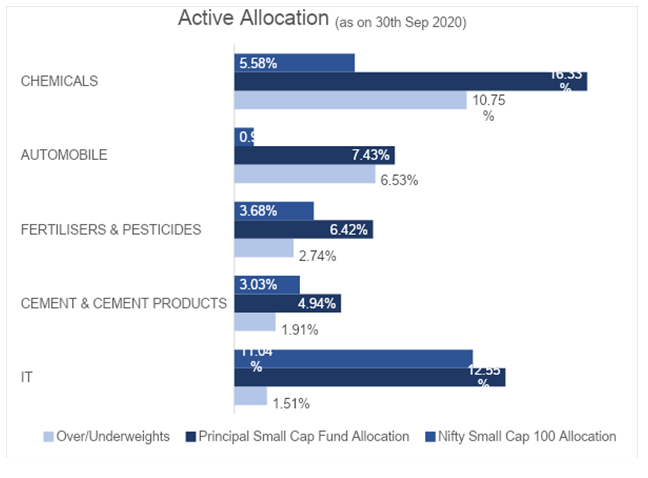What are the factors and events that could impact the small cap space in the near term? And how could investors take advantage of them?
The small cap companies are an integral part of the economy and hence would continue to be impacted in a similar manner with the developments in the economy and other related factors. However, it is noteworthy that many small sized businesses are leaders in their own market segments like building materials, textiles, speciality chemicals, logistics etc. These businesses probably have the capacity and the capability to grow even in these relatively challenging times. There would be companies in this category that continue to grow and are available at relatively attractive valuations. Investors can seek advice of their financial advisors and stagger their investments into small cap funds.
How comfortable are you with the small cap valuations right now?
We believe there are companies in the small cap space which are available at attractive valuations despite the market run up of recent months. Additionally, there are many small cap companies that have improved their cost efficiencies, very low debt and have built a robust business model overtime. As the volumes start picking in the markets, these companies may be better positioned for margin expansion compared to the historical trends. Stock selection would be the key factor in picking up the right small cap stocks.
Recently, a few fund houses have stopped accepting lumpsum investments in their small cap funds. Does it indicate that small cap funds are no longer attractive for lumpsum investments?
While it is a fact that a few fund houses have stopped accepting lump sum investment, one of the primary reasons for this decision could be the size of AUM. Since small cap stocks are relatively less liquid, there is a huge impact cost during buying and selling in case of funds with larger AUMs.
Some experts are of the view that tactical lumpsum investment works better than SIP in the small cap space. What do you think should be the right approach to invest in small cap funds?
Investments in all equity funds should be based on the investment goals of the investor and should take into account the risk appetite and the investment horizon of the investor. Lumpsum or SIP investments would be based on a number of factors including investment horizon, availability of investible corpus, risk appetite, etc. SIP is one of the disciplined investment routes. We believe that long term SIPs help in building sizable investment corpus along with opportunities of wealth creation for patient and disciplined investors. Since, equity investments are from a long-term perspective, it is important for investors to stay invested for the long-term as opposed to timing the markets.
People say small caps can give extraordinary returns in the long run. However, 10 year industry data shows that small cap have delivered returns at par with large cap and mid cap funds. Why do you think investors should take higher risk to earn at par returns?
Small cap funds provide a necessary diversification within an investors’ equity portfolio. Investments in small cap companies tend to be generally more volatile than comparable investments in large cap companies. However, given the unpredictability of returns in equity markets and volatility of investments, investors should hold a diversified portfolio of equity investments and their investments should be aligned with their investment goals, risk appetite and investment horizons.
Principal Small Cap Fund has delivered handsome returns since its inception in May last year. What has worked in its favour?
The Principal Small Cap fund follows a robust investment process and stock selection strategy. Some of the themes that have contributed to the returns in the past 12 to 15 months are Chemicals, the Agri sector (segments like fertilizers & pesticides, agri chemicals, farm equipment etc.), as well as sectors like Consumer Discretionary, cement, packaging segments etc.
In recent months addition of select companies in the IT and Auto sectors have also contributed to performance.
Tell us about the fund management strategy of this fund. How is this fund different from other small cap funds?
The Principal Small Cap fund follows bottom up stock selection investment philosophy. Typically, we look for investment opportunities in stocks where we foresee growth at a reasonable price. The endeavour is to invest in robust businesses, with strong operating metrics and which have reasonably good growth visibility.
What are the risk mitigation strategies that you have deployed to reduce risk in small cap funds?
The Principal Small Cap Fund has a well-diversified portfolio across 23 industries and 68 companies as on 30th Sep 2020. Single stock exposure in the portfolio is limited to 4% of the portfolio. The portfolio construction process includes concentration limits and liquidity analysis. The fund also invests a part of the portfolio in large and midcap companies to meet liquidity requirements as well as reduce the portfolio volatility.
What are your top active selections in the portfolio and why?

The portfolio is overweight on chemicals. The Specialty Chemical business in India has been gaining momentum over the past few years and many companies have developed significant knowledge and skill surrounding complex Chemistry. Further, they have managed to secure long term contracts with global agri and pharma players thus leading to significant investments in creating global scale capacities. On the other hand, the de-risking of supply chains from China is expected to additionally benefit the specialty chemical companies in India. Other overweight sectors included Automobiles, Cement & Cement Products and Fertilizers & Pesticides. Higher exposure to Cement & Cement Products is based on our expectation that the demand for building materials would revive especially due to the revival in rural consumption and housing demand. Given the huge support from the government and migrants returning to villages from cities thereby improving labour availability for agriculture – this is a positive for the Fertilizers & Pesticides sector.
What should be the ideal time horizon to invest in small cap funds?
An investor in a small cap fund should ideally have an investment horizon of more than 5 years. We would advise investors to consult their financial advisors for further guidance on asset allocation and investment horizon.
Why should advisors recommend this scheme to their clients?
The Principal Small Cap Fund portfolio is well diversified across sectors. The companies under this portfolio are high quality businesses with proven track record and strong balance sheets. Advisors should recommend this fund based on their assessment of the risk appetite and the financial goals of the investor.
Small cap funds are typically a part of a well-diversified fund portfolio for equity investors. While for most investors, the core equity portfolio should be diversified or large cap oriented, adding a small cap fund to the portfolio may potentially add to returns.






